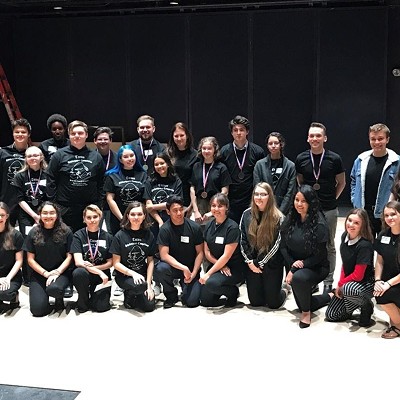The Rogue Theatre has cheerfully tagged this season's playlist as the season of lust. But based on its first two offerings, including William Shakespeare's Measure for Measure, which opened last weekend, one could propose that a more telling name might be the season of botched beheadings.
Then again, lust and beheading do seem to reside in close quarters.
In Measure for Measure, Shakespeare concocts a story, based partly on George Whetstone's Promos and Cassandra, that raises a raft of questions about human behavior. Here, the beheadings are the consequence of grievous offenses, one of which is fornication. The Venetian law has not been enforced for years, but the transgression has become problematic because of resulting diseases and mounting mouths to feed.
Duke Vincentio (Joseph McGrath) decides to take a vacation, naming his trusted associate, Angelo (Matt Bowdren), as enforcer of the law. But the duke decides to pose as a friar to observe clandestinely the goings-on in his fair city when he's not around. So far, then, the duke has ducked out of his duties and is at the very least an untrusting sort who has no problem with misrepresenting himself so he can sneak around and insinuate himself in the course of things. But it turns out that it's a good thing he does.
Young Claudio (Connor Foster) has been sentenced to hanging because his transgression is documented by a pregnant lover. His sister, Isabella (Marissa Garcia), has a calling as a nun, but has not yet taken vows, and cherishes her virginity to the extreme. When she hears of Claudio's situation, she beseeches Angelo to pardon him. He refuses, but he is stirred by the young woman and devises a plan whereby Claudio can be spared, with Isabella's cooperation. It changes our minds about Angelo's honor, poses a moral crisis for Isabella and results in complications that not only fill five acts, but send us away with more questions than conclusions.
If you're a Shakespeare fan, you have a chance here to experience a fine production of one of his lesser-staged plays. David Morden directs a crew of actors who generally show great facility with Shakespeare's mouthfuls of dialogue. It's presented in a straightforward manner, with no tricks of place or time. The simple set works well, as do the costumes and lighting. There are also fine performances from secondary characters, especially from Ryan Parker Knox as Pompey and Lee Rayment as Lucio. Paul Amiel provides live music.
There are a couple of things that present some difficulties. The audience is seated on three sides, which ensures that patrons will be behind actors at numerous points. This makes it often difficult to hear and understand the unfamiliar language.
Also problematic is the character of Angelo. It's bewildering why Bowdren, a very good actor, and Morden have Angelo be so starkly one-dimensional. He may be a dark angel, and ultimately unlikable, but we need to have some sense of him beyond his words and stiff bearing.
This is a rather dark play, first presented after King James I had been seated, and although it is considered a comedy, it points to themes Shakespeare will explore in his great tragedies. Here, the play's title refers to the "eye for an eye" concept of justice. Deception, sex, mortality, marriage and political corruption are also themes that Shakespeare weaves into his tale and that, in typical cerebral fashion, Rogue invites us to chew on. It is quite a meal.
Studio Connections is a community group led by performer and educator Robert Encila. According to its statement of purpose, it is dedicated to arts education, developing leadership and fostering community building. It actually developed as an after-school ministry associated with various churches. As such, it's not exactly a theater in the traditional sense, but it does provide a venue for people who love performing, but are not really professionally inclined, to do what they love. Skill levels vary, but there is a commitment from all involved to work with passion and sincerity.
But a common passion and sincerity can take folks to sometimes surprising heights. This certainly seems to be the case for the musical A Man of No Importance, an ambitious project undertaken by Encila and a group of enthusiastic performers and skilled musicians. On opening weekend, the group had the small upstairs Cabaret Theatre at the Temple of Music and Art bursting at the seams with the joy of creation.
The play premiered in 2002 and is based on the 1994 film starring Albert Finney. With book by Terrence McNally, lyrics by Lynn Ahrens and music by Stephen Flaherty, it is a story set in 1964 about an amateur playmaking group that uses space in a parish to present its productions. Their director, Alfie Byrne (Dennis Tamblyn), is a bus driver in Dublin, but his real interest is books and art, and especially Oscar Wilde. He and his group are preparing to present Wilde's Salome, although they are getting resistance from the church because of the play's questionable moral tone. Byrne himself is having doubts about his life and work, and struggles with the possibility that he is inclined to "the love that dare not speak its name."
Tamblyn is an accomplished opera singer, and his beautiful vocals anchor the solid and soaring voices of the rest of the cast. Although his acting skills are not equally as well-honed as his vocal ones, he brings us a lovely and sympathetic character.
Director Encila has led this large group well, and even though the small stage gives him and his cast some challenges, they are met with spirit. And the cast members who get a moment in the spotlight with their own solos are almost impossible not to embrace.
The result is a feisty, sweet and heartfelt endeavor. Encila and his colleagues can be proud.











